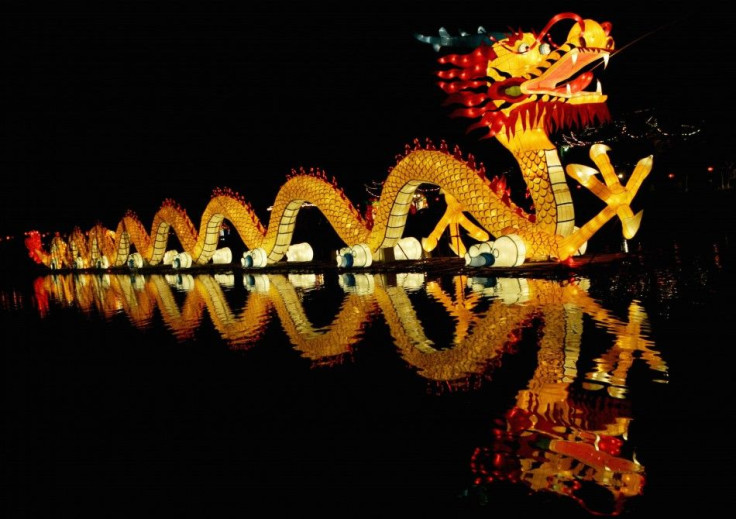Chinese New Year's Eve 2012: World Celebrates the Year of the Dragon

It's Chinese New Year's Eve 2012 and the world is celebrating the start of the Year of the Dragon in fantastic style.
From Hong Kong and Seoul to Toronto and San Francisco, parades, fireworks, music, and most importantly food, have made today a great festival for cultures that celebrate the Chinese New Year, also known as the Lunar New Year.
A Multicultural Affair
Originally known only as the Chinese New Year, it has also taken on the more inclusive Lunar New Year title in recent years, as Korean and other Asian communities--and even some Arab cultures--have taken to the holiday in recent decades, making the fete one of the most popular holidays in the world.
The festivities kick off on the second new moon after the winter solstice. There are two weeks of fun before the height of the fun, Chinese New Year's Eve, when revelers stay up late with family and friends celebrating all night before Lunar New Year Day, known as Yuan Dan.
Chinese New Year's Eve can be seen as analogous to the western New Year's Eve celebration, in which thousands of people fight each year to keep their eyelids open to watch the ball drop at midnight each Jan. 1 in Times Square under the guidance of Dick Clark, and now Ryan Seacrest.
Like Thanksgiving plus Christmas:
As Fred Fu, the Chinese-American president of the Flushing Development Center in Flushing, Queens--one of the largest Chinese enclaves in America--puts it, Lunar New Year is most Chinese people's favorite holiday.
New Year is like Thanksgiving plus Christmas. First, it's a reunion. Everyone comes back home and on Lunar New Year's Eve everyone has dinner together as a family, he explained Friday. It's also a big way for the family to celebrate a holiday, to celebrate the end of the year, to celebrate a good year and celebrate the future year.
Each year the Chinese New Year ushers in a new animal zodiac determined by a 12-year-cycle. All many Americans know of this concept is what they have gleaned by looking up their animal on Chinese restaurant placemats. But the holiday's intrigue goes far beyond determining whether one should mate with a rat or a tiger.
Last year was the Year of the Rabbit, and Lunar New Year 2012 marks the start of the Chinese Year of the Dragon. Fu says the fact that Chinese New Year 2012 is named for the dragon signifies good things to come in 2012.
The dragon is clever, strong, king of the animals, gets out evil, he explained.
Humble origins yield lasting traditions:
The Lunar New Year, which is based on the Chinese lunisolar calendar, falls on a different date on the Gregorian calendar used by Western countries.
The holiday is rooted in myth, as so many are throughout the world. Villagers in ancient China supposedly set red lanterns and food out each year to scare away a beast named Nian who terrorized children and destroyed farmers' crops throughout the rest of the year.
It started long ago when everyone was a farmer. We don't know how long, maybe thousands of years ago, Fu said. In the wintertime you have nothing to do so the farmers' life was over--it was not an industrial time--so they celebrated for 15 days.
Today in China, citizens' homes are decked out with Chinese paintings, lanterns, good-luck phrases and more, all in celebration of Chinese New Year's Eve and the start of the Year of the Dragon.
They also got new clothes and haircuts to make sure they look their best on the Chinese New Year's Eve feast. The event is anticipated all year for its fireworks, dancing, music and food, all of which rose out of the tale of Nian.
Koreans get in on the fun
The holiday has grown in recent decades to become an important day for Koreans as well, and many Koreans celebrate the Lunar New Year in the spirit of hyo, the traditional Korean virtue of reverence for the elderly, by helping their seniors in various ways.
One major tradition in the Korean celebrations of the Lunar New Year is the eating of dduk guk, a rice cake soup they make sure to eat each year in order to ensure good luck in the ensuing year.
No matter what ethnicity you are, Chinese New Year parades and festivals are a great opportunity to have fun and get some culture while you're at it.
The links below provide information about some of the cities with the largest Chinese New Year and Chinese New Year's Eve 2012 celebrations in North America:
Chinese New Year 2012 Events:
The Southwest Airlines Chinese New Year 2012 Parade in San Francisco
Chinatown, New York Chinese New Year 2012 firecracker ceremony, cultural festival and parade
Toronto, Canada's Chinese New Year 2012 festivities
Los Angeles Lunar New Year 2012 celebrations
Guide to Lunar New Year events in Washington, D.C.
© Copyright IBTimes 2024. All rights reserved.





















